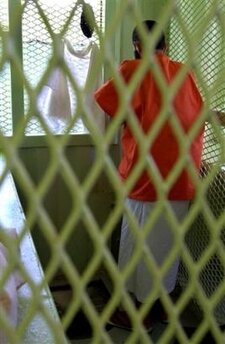- USA Fawzi al-Odah (m), Kuwaiti national
- Jumah al-Dossari (m), Bahraini national
- Shaker Aamer (m), UK resident
- Abu-Bakr al-Shammari (m), Yemeni national
- An unknown number of Guantánamo detainees
 Detainees at Guantánamo participating in the hunger strike are reported to have been placed into isolation, strapped into restraint chairs, been subjected to painful force-feeding methods and deprived of "comfort items" such as blankets and books.
Detainees at Guantánamo participating in the hunger strike are reported to have been placed into isolation, strapped into restraint chairs, been subjected to painful force-feeding methods and deprived of "comfort items" such as blankets and books.
Kuwaiti national Fawzi al-Odah told his lawyer that on 11 January 2006 he ended his hunger strike after being threatened with force-feeding using a thick tube with a metal edge whilst restrained. He says that the previous day he had heard the screams of a detainee in an adjacent room being force-fed in this manner and that he had also heard a doctor tell this detainee, "I have to do this, I have to cause you pain." The detainee who was force-fed later advised Fawzi al-Odah that he should eat voluntarily so as not to experience the pain.
Lawyers for other detainees have told Amnesty International that the hunger strikers have been moved into isolation in cold rooms, strapped into restraint chairs and deliberately force-fed too much food, causing them extreme pain and, in some cases, diarrhoea. Many of the hunger strikers were forced to submit to this process several times a day.
Fawzi al-Odah has said that some of those detainees were forced to urinate and defecate on themselves because they remained strapped to the restraint chairs.
Some are also said to have vomited blood. As a result of these force-feeding methods the numbers participating in the hunger strike is believed to have dropped dramatically. Of the long-term hunger strikers, only three or four are thought to be continuing, although some reports suggest that a number of other detainees have now joined the hunger strike to protest against the force-feeding methods. Fawzi al-Odah's lawyer has stated that "it is clear that the government has ended the hunger strike through the use of force and through the most brutal and inhumane types of treatment."
A Pentagon spokesperson has said that force-feeding is being carried out in a humane and compassionate manner" and was used only when necessary to keep the detainees alive. Twenty-five "Emergency Restraint Chairs" are reported to have been sent to Guantánamo between 5 December 2005 and 10 January 2006.
BACKGROUND INFORMATION
Detainees at Guantánamo began the current hunger strike in August 2005. They are demanding for their rights under international law to be respected, and to be released if they are not charged and given a fair trial. They have also requested that organizations such as Amnesty International be permitted to visit them. Some have expressed their determination to continue the hunger strike until death.
Amnesty International neither opposes nor recommends forcible feeding of prisoners on hunger strike. However, if forcible feeding is done in such a way as deliberately to cause suffering, Amnesty International considers that this may constitute torture or other cruel, inhuman or degrading treatment. The UN Special Rapporteur on torture has declared that if the reports about the force-feeding methods being used at Guantánamo are true, then it would amount to cruel treatment.
- Click Here for Guantanamo Bay Information


 Detainees at Guantánamo participating in the hunger strike are reported to have been placed into isolation, strapped into restraint chairs, been subjected to painful force-feeding methods and deprived of "comfort items" such as blankets and books.
Detainees at Guantánamo participating in the hunger strike are reported to have been placed into isolation, strapped into restraint chairs, been subjected to painful force-feeding methods and deprived of "comfort items" such as blankets and books.


